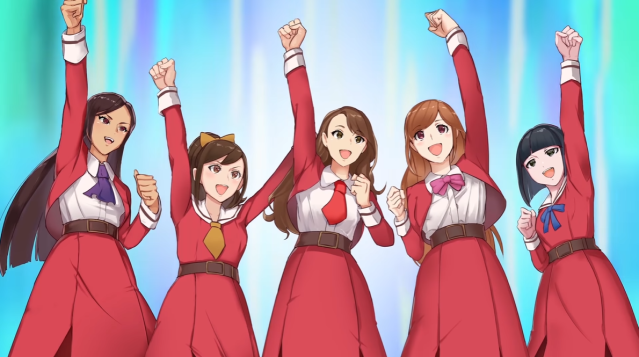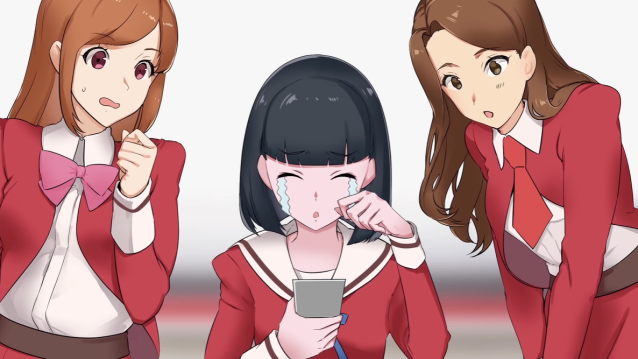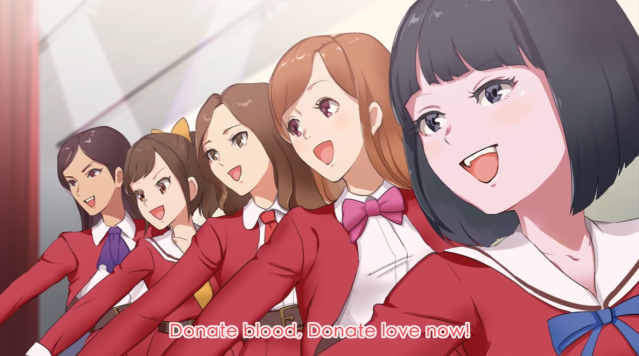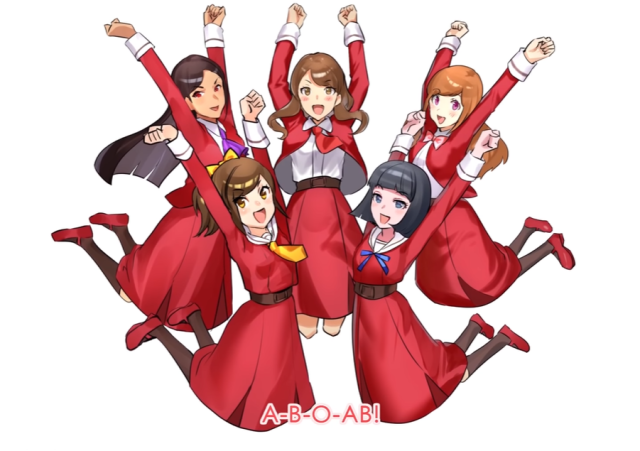
The girls of KKT21 want you to bleed for the good of society.
As The Birth of KKT21 opens, aspiring idol singer Sara is running late. As she dashes into the meeting room where the other four members of her just-formed idol unit have been waiting, she explains that she stopped to give directions to a woman she bumped into on the street who was on her way to donate blood.
That’s all the girls’ manager needs to hear before declaring that hence forth, the idol group will be known as KKT21, an abbreviation of Kenketsu (“Blood Donation”) 21st Century.
If the animation is a little choppy, that’s because The Birth of KKT21 isn’t the latest late-night TV anime offering. The five-and-a-half-minute short was actually produced by Japan’s Ministry of Health, Labour and Welfare, in response to dwindling blood donations from people in their 20s and teens (though as KKT21’s manager points out to 15-year-old Masumi, you have to be at least 16 to donate blood in Japan).
▼ But you’re never too young to be moved to tears by reading messages of thanks from people whose lives were saved by blood transfusions.
After getting their group name, KKT21 spends a lot more of their on-screen time talking about blood than they do music. Modern science still can’t synthesize human blood, they learn, and also that blood samples can’t be preserved for very long, meaning that there’s a constant need for volunteers. Luckily, they also discover there’s an online search engine that can direct would-be donors to nearby blood drives and donation facilities.
There’s quite a bit of talking, but the Ministry of Health, Labor and Welfare realizes that when you make an idol anime, you’d better give the audience at least one big song-and-dance scene, which comes when KKT21 sings their debut single, “A-B-O-AB! -Ima no Kimi ni Dekiru Koto-“ (or “A-B-O-AB! -The Thing You Can Do Right Now-“), which we’ve cued up below.
Granted, the members of KKT21 don’t move smoothly or sing in perfect-pitch harmony, but those are criticisms you could lob at a lot of real-life idol singer groups too, especially when they’re just starting out. And even if the Ministry of Health, Labor and Welfare’s foray into idol anime ends up as a one-and-done deal, hopefully it’ll still lead to blood donation centers receiving a few extra vials of otaku-sourced hemoglobin, and maybe those generous volunteers will get some merch from higher-quality anime in return.
Images: YouTube/MHLWchannel
● Want to hear about SoraNews24’s latest articles as soon as they’re published? Follow us on Facebook and Twitter!
[ Read in Japanese ]





 Heading to Comiket this year? Be sure to donate blood for a special gift!
Heading to Comiket this year? Be sure to donate blood for a special gift! Controversial busty manga girl Red Cross poster’s artist donates blood
Controversial busty manga girl Red Cross poster’s artist donates blood Japanese blood donation mascot loses her head at the ski ramp 【Video】
Japanese blood donation mascot loses her head at the ski ramp 【Video】 “Drain me of my blood!” Otaku rush to donate for anime VTuber nurse
“Drain me of my blood!” Otaku rush to donate for anime VTuber nurse Fewer Japanese people got married last year than any time since the end of World War II
Fewer Japanese people got married last year than any time since the end of World War II Demon Slayer: Kimetsu no Yaiba gets new roller coaster attractions and food at Universal Studios Japan
Demon Slayer: Kimetsu no Yaiba gets new roller coaster attractions and food at Universal Studios Japan Japan’s new difficult-to-drink-from beer glass protects your liver, but it’s a brutal experience
Japan’s new difficult-to-drink-from beer glass protects your liver, but it’s a brutal experience New Nintendo Lego kit is a beautiful piece of moving pixel art of Mario and Yoshi【Photos】
New Nintendo Lego kit is a beautiful piece of moving pixel art of Mario and Yoshi【Photos】 How to order snacks on a Shinkansen bullet train in Japan
How to order snacks on a Shinkansen bullet train in Japan New samurai glasses are Japan’s latest weird must-have souvenir
New samurai glasses are Japan’s latest weird must-have souvenir Come play hide-and-seek on a deserted Japanese island this August and November
Come play hide-and-seek on a deserted Japanese island this August and November New Pokémon ice cream, dessert drinks, and cool merch coming to Baskin-Robbins Japan【Pics】
New Pokémon ice cream, dessert drinks, and cool merch coming to Baskin-Robbins Japan【Pics】 Caffeinated ramen for gamers that you can eat with one hand going on sale in Japan
Caffeinated ramen for gamers that you can eat with one hand going on sale in Japan Starbucks Japan unveils New Year’s collection for 2024, with daruma, dragons and Mt Fuji for luck
Starbucks Japan unveils New Year’s collection for 2024, with daruma, dragons and Mt Fuji for luck Real Buddhist monk plays Super Mario Bros., recites prayers every time he kills an enemy【Video】
Real Buddhist monk plays Super Mario Bros., recites prayers every time he kills an enemy【Video】 Nintendo history you can feel – Super NES, N64, and GameCube controllers become capsule toys
Nintendo history you can feel – Super NES, N64, and GameCube controllers become capsule toys Hello, cosmetics! Clinique teams up with Hello Kitty this summer for first-time collaboration
Hello, cosmetics! Clinique teams up with Hello Kitty this summer for first-time collaboration “The most Delicious Cup Noodle in history” – Japan’s French Cup Noodle wins our heart【Taste test】
“The most Delicious Cup Noodle in history” – Japan’s French Cup Noodle wins our heart【Taste test】 Starbucks releases a cute Frappuccino and Unicorn Cake…but not in Japan
Starbucks releases a cute Frappuccino and Unicorn Cake…but not in Japan Kyoto Tower mascot termination reveals dark side behind cute Japanese characters
Kyoto Tower mascot termination reveals dark side behind cute Japanese characters McDonald’s Japan’s Soft Twist Tower: A phantom ice cream only sold at select branches
McDonald’s Japan’s Soft Twist Tower: A phantom ice cream only sold at select branches Yabai Ramen: What makes this Japanese ramen so dangerous?
Yabai Ramen: What makes this Japanese ramen so dangerous? Finally! Nintendo Japan expands Switch 8-bit controller sales to everybody, Online member or not
Finally! Nintendo Japan expands Switch 8-bit controller sales to everybody, Online member or not Japanese government wants to build luxury resorts in all national parks for foreign tourists
Japanese government wants to build luxury resorts in all national parks for foreign tourists To combat declining birth rate, Japan to begin offering “Breeding Visas” to foreigners
To combat declining birth rate, Japan to begin offering “Breeding Visas” to foreigners 10 things you should buy at 7-Eleven in Japan
10 things you should buy at 7-Eleven in Japan Studio Ghibli releases anime heroine cosplay dresses that are super comfy to wear
Studio Ghibli releases anime heroine cosplay dresses that are super comfy to wear Woman charged for driving suitcase without a license in Osaka
Woman charged for driving suitcase without a license in Osaka Studio Ghibli unveils My Neighbour Totoro miniature house model
Studio Ghibli unveils My Neighbour Totoro miniature house model Kyoto experiencing problems with foreign tourists not paying for bus fares, but not on purpose
Kyoto experiencing problems with foreign tourists not paying for bus fares, but not on purpose Fighting mild hunger with a Japanese soda that turns into jelly in the stomach【Taste test】
Fighting mild hunger with a Japanese soda that turns into jelly in the stomach【Taste test】 Studio Ghibli’s Howl’s Moving Castle tapestry unveiled in Japan for first time
Studio Ghibli’s Howl’s Moving Castle tapestry unveiled in Japan for first time McDonald’s new Happy Meals offer up cute and practical Sanrio lifestyle goods
McDonald’s new Happy Meals offer up cute and practical Sanrio lifestyle goods Sales of Japan’s most convenient train ticket/shopping payment cards suspended indefinitely
Sales of Japan’s most convenient train ticket/shopping payment cards suspended indefinitely Sold-out Studio Ghibli desktop humidifiers are back so Totoro can help you through the dry season
Sold-out Studio Ghibli desktop humidifiers are back so Totoro can help you through the dry season Japanese government to make first change to romanization spelling rules since the 1950s
Japanese government to make first change to romanization spelling rules since the 1950s Foreigner’s request for help in Tokyo makes us sad for the state of society
Foreigner’s request for help in Tokyo makes us sad for the state of society Ghibli founders Toshio Suzuki and Hayao Miyazaki contribute to Japanese whisky Totoro label design
Ghibli founders Toshio Suzuki and Hayao Miyazaki contribute to Japanese whisky Totoro label design Doraemon found buried at sea as scene from 1993 anime becomes real life【Photos】
Doraemon found buried at sea as scene from 1993 anime becomes real life【Photos】 Tokyo’s most famous Starbucks is closed
Tokyo’s most famous Starbucks is closed Princesses, fruits, and blacksmiths: Study reveals the 30 most unusual family names in Japan
Princesses, fruits, and blacksmiths: Study reveals the 30 most unusual family names in Japan Japanese idols cut to the chase, charge fans 10,000 yen to talk to them for three minutes
Japanese idols cut to the chase, charge fans 10,000 yen to talk to them for three minutes Japanese idol reveals disgusting secret about stuffed animals she’s received from fans
Japanese idol reveals disgusting secret about stuffed animals she’s received from fans The 10 best anime about idols, as chosen by the Internet masses
The 10 best anime about idols, as chosen by the Internet masses Yamagata blood donor out for blood, headbutts Red Cross staff after “waiting forever” in line
Yamagata blood donor out for blood, headbutts Red Cross staff after “waiting forever” in line Beautiful idol singer leaves show business, opens delicious ramen restaurant in Tokyo
Beautiful idol singer leaves show business, opens delicious ramen restaurant in Tokyo With Comiket returning, so is its anime-posters-for-otaku-blood blood drive
With Comiket returning, so is its anime-posters-for-otaku-blood blood drive Ghibli Museum asking for donations from overseas fans to help it through hard times
Ghibli Museum asking for donations from overseas fans to help it through hard times Cover up out there! 21 dead in Japan from virus spread by mites
Cover up out there! 21 dead in Japan from virus spread by mites What do North Korean idol singers sound like? Like this 【Videos】
What do North Korean idol singers sound like? Like this 【Videos】 Free Sailor Moon condoms to be given out by Japanese government
Free Sailor Moon condoms to be given out by Japanese government Nintendo takes steps to protect staff from growing problem of customer harassment
Nintendo takes steps to protect staff from growing problem of customer harassment “There are many mentally unwell girls in AKB48” claims ex-member of Japan’s top idol singer group
“There are many mentally unwell girls in AKB48” claims ex-member of Japan’s top idol singer group Survey by Japanese ministry reveals high rates of “maternity harassment” in workplace
Survey by Japanese ministry reveals high rates of “maternity harassment” in workplace Japanese idol singer holds memorial concert for 55-year-old fan who died alone and had no funeral
Japanese idol singer holds memorial concert for 55-year-old fan who died alone and had no funeral
Leave a Reply